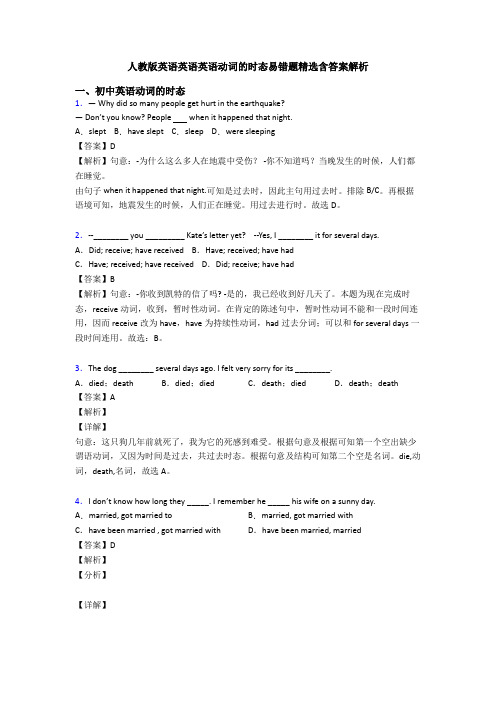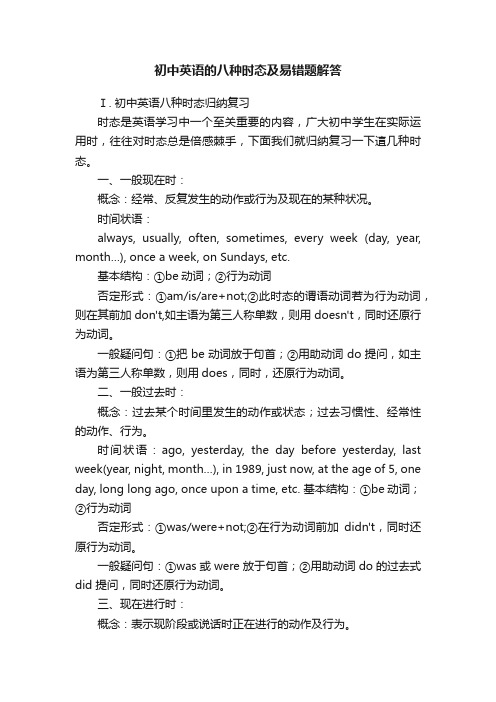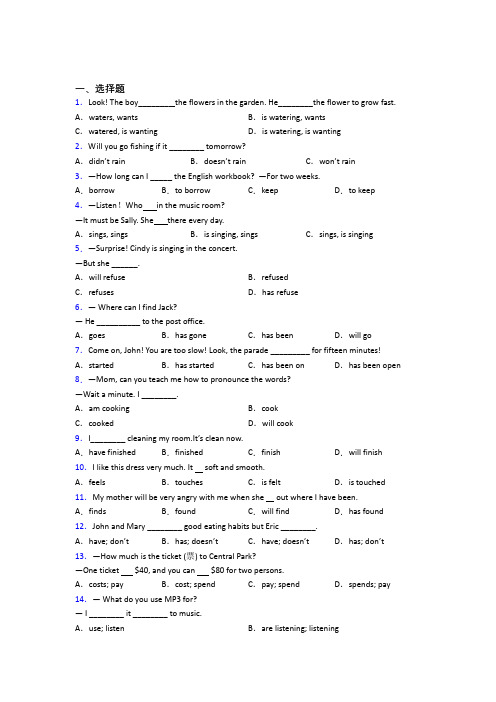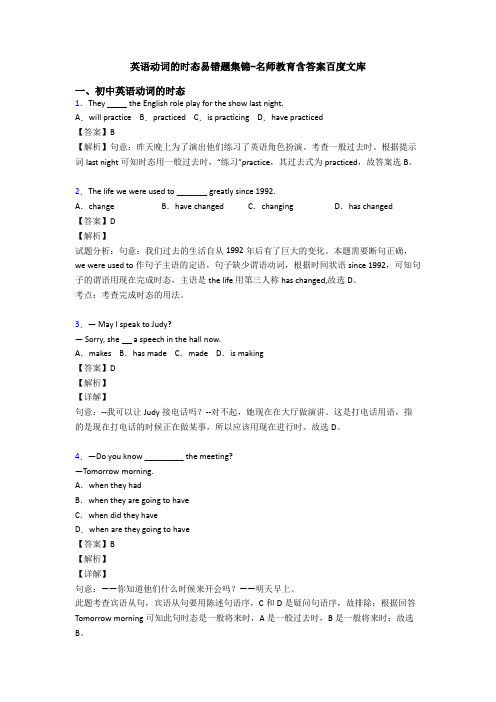中考英语八大时态易错题荟萃[001]
人教版英语英语英语动词的时态易错题精选含答案解析

人教版英语英语英语动词的时态易错题精选含答案解析一、初中英语动词的时态1.— Why did so many people get hurt in the earthquake?—Don’t you know? People when it happened that night.A.slept B.have slept C.sleep D.were sleeping【答案】D【解析】句意:-为什么这么多人在地震中受伤? -你不知道吗?当晚发生的时候,人们都在睡觉。
由句子when it happened that night.可知是过去时,因此主句用过去时。
排除B/C。
再根据语境可知,地震发生的时候,人们正在睡觉。
用过去进行时。
故选D。
2.--________ you _________ Kate’s letter yet? --Yes, I ________ it for several days. A.Did; receive; have received B.Have; received; have hadC.Have; received; have received D.Did; receive; have had【答案】B【解析】句意:-你收到凯特的信了吗? -是的,我已经收到好几天了。
本题为现在完成时态,receive动词,收到,暂时性动词。
在肯定的陈述句中,暂时性动词不能和一段时间连用,因而receive改为have,have为持续性动词,had过去分词;可以和for several days一段时间连用。
故选:B。
3.The dog ________ several days ago. I felt very sorry for its ________.A.died;death B.died;died C.death;died D.death;death【答案】A【解析】【详解】句意:这只狗几年前就死了,我为它的死感到难受。
英语中考八大时态讲解及习题

英语中考八大时态讲解及习题Ⅰ. 初中英语八种时态归纳复习1.一般现在时2.一般过去时3.现在进行时4.过去进行时5.现在完成时6.过去完成时7.一般将来时8.过去将来时一、一般现在时:概念:经常、反复发生的动作或行为及现在的某种状况。
时间状语:always, usually, often, sometimes, every week (day, year, month…), once a week, on Sundays, etc.基本结构:①be动词;②行为动词否定形式:①am/is/are+not;②此时态的谓语动词若为行为动词,则在其前加don't,如主语为第三人称单数,则用doesn't,同时还原行为动词。
一般疑问句:①把be动词放于句首;②用助动词do提问,如主语为第三人称单数,则用does,同时,还原行为动词。
二、一般过去时:概念:过去某个时间里发生的动作或状态;过去习惯性、经常性的动作、行为。
时间状语:ago, yesterday, the day before yesterday, last week(year, night, month…), in 1989, just now, at the age of 5, one day, long long ago, once upon a time, etc. 基本结构:①be动词;②行为动词否定形式:①was/were+not;②在行为动词前加didn't,同时还原行为动词。
一般疑问句:①was或were放于句首;②用助动词do的过去式did 提问,同时还原行为动词。
三、现在进行时:概念:表示现阶段或说话时正在进行的动作及行为。
时间状语:now, at this time, these days, etc.基本结构:am/is/are+doing否定形式:am/is/are+not+doing.一般疑问句:把be动词放于句首。
初中英语8大时态精析,附易错题

初中英语8大时态精析,附易错题01一般现在时的用法1) 表示经常性或习惯性的动作,常与表示频度的时间状语连用。
例:every…, sometimes,ofen,always,usually, twice a week, at…, on Sunday等。
I leave home for school at 7 every morning.He watches Tv once a week .2) 表示普遍真理,客观存在,科学事实。
The earth moves around the sun.Shanghai lies in the east ofChina.3) 格言或警句。
Pride goes before a fall. 骄者必败。
注意:此用法如果出现在宾语从句中,即使主句是过去时,从句谓语也要用一般现在时。
例:Columbus proved that the earth is round..4) 表示现在时刻的状态、能力、个性或爱好。
I don't want so much.Ann Wang writes good English but does not speak well.比较:Now I put the sugar in the cup.I am doing my homework now.第一句用一般现在时,用于操作演示或指导说明的示范性动作,表示言行的瞬间动作。
再如:Now watch me, I switch on the current and stand back.第二句中的now是进行时的标志,表示正在进行的动作的客观状况,所以后句用一般现在时。
02一般过去时的用法1)在确定的过去时间里所发生的动作或存在的状态。
时间状语有:yesterday, an hour ago, the other day, in 1982,yesterday morning (afternoon, vening…),last night (week, month, year…), a moment ago , a week ago, three years ago…just now,等。
人教版中考英语中考英语总复习 动词的时态易错大盘点

人教版中考英语中考英语总复习动词的时态易错大盘点一、初中英语动词的时态1.He likes music very much. He’s the school music club for half a year.A.joined B.taken part in C.joined in D.been in【答案】D【解析】【详解】句意:他非常喜欢音乐。
他在学校音乐俱乐部工作半年了。
A. joined“加入,参加”,指加入某党派、某组织或某社会团体;B. taken part in参加(群众性活动、会议等);C. joined in 表示参加某项运动或活动;D. been in经常表示状态,而且寓意更为丰富【执政;在家;到达;在…里面参加…运动项目;从事等】。
half an hour表示的是时间段,而A,B,C选项都是短暂性的动词或词组,在肯定句中不能与表示一段的时间状语连用,用join的延续性形式be in,故答案为D。
2.Every year many foreigners ________ to China to learn Chinese.A.come B.have come C.came D.will come【答案】A【解析】句意:每年许多外国人来中国学习汉语。
根据Every year可知用一般现在时态;故选A3.—There are so many swimmers swimming in the swimming pool.—Yes, and sixty percent _ children.A.is B.are C.was D.were【答案】B【解析】句意:——在游泳池里有那么多游泳者正在游泳。
——是的,而且百分之六十是孩子。
根据谓语are可知此处用一般现在时,故排除CD两项。
此处的sixty percent代指的是百分之六十的游泳者,故谓语用复数形式,故选B。
4.___ you ____ my watch? Yes, I ____ it on the table just now.A.Did , see , saw B.Did , see , see C.Have , seen, saw. D.Have , seen, have seen【答案】C【解析】句意:——你看见我的手表了吗?——是的,我刚才在桌子上看到了。
初中英语的八种时态及易错题解答

初中英语的八种时态及易错题解答Ⅰ. 初中英语八种时态归纳复习时态是英语学习中一个至关重要的内容,广大初中学生在实际运用时,往往对时态总是倍感棘手,下面我们就归纳复习一下這几种时态。
一、一般现在时:概念:经常、反复发生的动作或行为及现在的某种状况。
时间状语:always, usually, often, sometimes, every week (day, year, month…), once a week, on Sundays, etc.基本结构:①be动词;②行为动词否定形式:①am/is/are+not;②此时态的谓语动词若为行为动词,则在其前加don't,如主语为第三人称单数,则用doesn't,同时还原行为动词。
一般疑问句:①把be动词放于句首;②用助动词do提问,如主语为第三人称单数,则用does,同时,还原行为动词。
二、一般过去时:概念:过去某个时间里发生的动作或状态;过去习惯性、经常性的动作、行为。
时间状语:ago, yesterday, the day before yesterday, last week(year, night, month…), in 1989, just now, at the age of 5, one day, long long ago, once upon a time, etc. 基本结构:①be动词;②行为动词否定形式:①was/were+not;②在行为动词前加didn't,同时还原行为动词。
一般疑问句:①was或were放于句首;②用助动词do的过去式did 提问,同时还原行为动词。
三、现在进行时:概念:表示现阶段或说话时正在进行的动作及行为。
时间状语:now, at this time, these days, etc.基本结构:am/is/are+doing否定形式:am/is/are+not+doing.一般疑问句:把be动词放于句首。
(易错题精选)初中英语语法知识—动词时态的分类汇编含答案解析(1)

一、选择题1.Look! The boy________ the flowers in the garden. He________the flower to grow fast. A.waters, wants B.is watering, wantsC.watered, is wanting D.is watering, is wanting2.Will you go fishing if it ________ tomorrow?A.didn’t rain B.doesn’t rain C.won’t rain 3.—How long can I _____ the English workbook? —For two weeks.A.borrow B.to borrow C.keep D.to keep 4.—Listen!Who in the music room?—It must be Sally. She there every day.A.sings, sings B.is singing, sings C.sings, is singing 5.—Surprise! Cindy is singing in the concert.—But she ______.A.will refuse B.refusedC.refuses D.has refuse6.— Where can I find Jack?— He __________ to the post office.A.goes B.has gone C.has been D.will go 7.Come on, John! You are too slow! Look, the parade _________ for fifteen minutes! A.started B.has started C.has been on D.has been open 8.—Mom, can you teach me how to pronounce the words?—Wait a minute. I ________.A.am cooking B.cookC.cooked D.will cook9.I________ cleaning my room.It’s clean now.A.have finished B.finished C.finish D.will finish 10.I like this dress very much. It soft and smooth.A.feels B.touches C.is felt D.is touched 11.My mother will be very angry with me when she out where I have been.A.finds B.found C.will find D.has found 12.John and Mary ________ good eating habits but Eric ________.A.have; don’t B.has; doesn’t C.have; doesn’t D.has; don’t 13.—How much is the ticket (票) to Central Park?—One ticket $40, and you can $80 for two persons.A.costs; pay B.cost; spend C.pay; spend D.spends; pay 14.— What do you use MP3 for?— I ________ it ________ to music.A.use; listen B.are listening; listeningC.use; to listen D.is listening; to listening15.--Look! Someone the classroom.--Well,it wasn't me. I didn't do it.A.is cleaning B.was cleaning C.has cleaned D.will clean 16.Jack ______ a good rest as soon as he finishes the exam.A.has B.had C.is having D.will have17.He _______ to school by bike, but now he _____ to school on foot.A.used to going, gets used to goingB.used to go, gets used to goC.used to go, gets used to going18.Look! Dave __________ on the phone.A.talks B.are talking C.talk D.is talking 19.He to the zoo yesterday.A.goes B.go C.goed D.went 20.— How ________ your trip to Australia?—Great. I’ll go there again next year.A.was B.is C.are D.were 21.We were in Qingdao last spring and _______ great fun there.A.is having B.are having C.had D.have 22.The film Operation Red Sea_____a lot of praise since its first show months ago. A.wins B.win C.will win D.has won 23.— Mum, where is Dad?— He _________ flowers in the garden now.A.planted B.plants C.will plant D.is planting 24.With a book in his hand, the boy ________ in bed.A.lie B.lied C.lay D.lying 25.—I called you at thre e yesterday afternoon, but you weren’t in.—I ________ a meeting at that time.A.had B.was having C.have had D.would have 【参考答案】***试卷处理标记,请不要删除一、选择题1.B解析:B【解析】【详解】句意:看!那个男孩正在花园里浇花。
初中英语中考时态语态易错点

中考时态易错点1.一般过去时与过去进行时的用法比较一般过去时表示的动作或状态已结束;而过去进行时表示的动作在过去某个时间正在进行,可能完成了,也可能未完成。
如:Mary wrote a letter to her friend last night.玛丽昨晚给她的朋友写了封信。
(信已写完) Mary was writing a letter to her friend last night.昨晚玛丽在给她的朋友写信。
(信不一定写完)(1)He always ____________ (go) to work by bus last year.(2)When we arrived, she ____________ (make) some fresh coffee.2.现在完成时与一般过去时的区别现在完成时表示过去发生的动作对现在造成的影响或结果,强调的是现在。
与现在完成时连用的时间状语有already,yet,still,just,so far,in the last (past) few years,before,ever,never,since +时间点,for+时间段等。
现在完成时不与具体的过去时间连用,如yesterday,last week,two days ago等。
一般过去时只表明过去的动作或状态,与现在无关,常与具体的过去时间连用,如ago,yesterday,last year,in 2002,just now等。
如:He has lived in New York for eight years他在纽约已经住了八年了。
(他现在仍在纽约) He lived in New York for eight years.他在纽约住了八年。
(他现在可能不在纽约了)(1)They ____________ (live) here since 1983. (2)I ____________ (see) this film yesterday.(3)I ____________ already ____________ (see) this film. (4)Ann ____________ (visit) her uncle last weekend.注意:since 用法(1)since+一般过去时态的时间状语从句如:He has been here since he joined the army.(2)It is / has been+一段时间+since从句“自从……以来已经多久了”如:It is / has been two years since I became a postgraduate student. 我成为研究生已有两年了。
英语动词的时态易错题集锦-名师教育含答案百度文库

英语动词的时态易错题集锦-名师教育含答案百度文库一、初中英语动词的时态1.They the English role play for the show last night.A.will practice B.practiced C.is practicing D.have practiced【答案】B【解析】句意:昨天晚上为了演出他们练习了英语角色扮演。
考查一般过去时。
根据提示词last night可知时态用一般过去时,“练习”practice,其过去式为practiced,故答案选B。
2.The life we were used to _______ greatly since 1992.A.change B.have changed C.changing D.has changed【答案】D【解析】试题分析:句意:我们过去的生活自从1992年后有了巨大的变化。
本题需要断句正确,we were used to作句子主语的定语,句子缺少谓语动词,根据时间状语since 1992,可知句子的谓语用现在完成时态,主语是the life 用第三人称has changed,故选D。
考点:考查完成时态的用法。
3.— May I speak to Judy?— Sorry, she a speech in the hall now.A.makes B.has made C.made D.is making【答案】D【解析】【详解】句意:--我可以让Judy接电话吗?--对不起,她现在在大厅做演讲。
这是打电话用语,指的是现在打电话的时候正在做某事,所以应该用现在进行时。
故选D。
4.—Do you know _________ the meeting?—Tomorrow morning.A.when they hadB.when they are going to haveC.when did they haveD.when are they going to have【答案】B【解析】【详解】句意:——你知道他们什么时候来开会吗?——明天早上。
- 1、下载文档前请自行甄别文档内容的完整性,平台不提供额外的编辑、内容补充、找答案等附加服务。
- 2、"仅部分预览"的文档,不可在线预览部分如存在完整性等问题,可反馈申请退款(可完整预览的文档不适用该条件!)。
- 3、如文档侵犯您的权益,请联系客服反馈,我们会尽快为您处理(人工客服工作时间:9:00-18:30)。
初中英语时态综合练习1.I will tell him as soon as he _____ backA. comeB. comesC. will comeD. came2. Mary _____ on shoes when she ____ them.A. tries…buysB. tries… buiesC. trys… buysD. trys…buies3. The girl often ______ cold when she ______.A. cathcs…dancesB. catches… dancesC. catchs… danceesD. catches… dancee4. _____ he ____ himself there? No, I don't think so.A. Do…enjoyB. Does… enjoiesC. Does… enjoysD.Does…enjoy5. ---_____ your teacher ____ from them very often? ---Certainly.A. Do…hearB. Does…hearC. Do… receiveD. receive6. _____ your mother _____ some cleaning on Sundays?A. Does…doesB. Do…doesC. Does…doD. Do… do7. _____ Tom _____to work hard to help his family ? Yes, he _____.A. Has… x…doesB. Has…x…doesC. Does…has…hasD. Do es… have…does8. Which teacher _____ lessons to you every day ?A. does …givesB. does… giveC. do… giveD. gives9. Smith does not go fishing on weekdays, ____? _____ ,he does.A. does he…NoB. does he…YesC. doesn't he…NoD. doesn't he…Yes10.Mr Black often _____ fishing on Sundays, _____ he ?A. goes…doesn'tB. goes…isn'tC. doesn't go…doesD. doesn't go…is11.He usually _____ TV on Sunday evening.A. watchB. watchesC. watchingD. is watching12. We'll go to play with snow if it ______ tomorrow.A. snowB. snowsC. will snowD. snowed13. Neither I nor he ______ French.A. speakB. doesn't speakC. speaksD. doesn't speak14. Nobody ______ how to run this machines.A . know B. have known C. knows D. is knowing15. The Young Pioneer _____ water for the old man every day.A. carryB. bringC. takesD. carries16. Some are ______ in the river and some are ______games.A. swimming… playingB. swimming…plaiingC. swimming… I playingD. swimming…plaing17. Look ! The boy students are _____ football while the girls are _____ .A. playing… danceB. playing… dancingC. play… dancingD. play… dance18. He _____ to do his lessons at eight every evening.A. is beginningB. is beginningC. beginD. begins19. _____ he _____ on well with his friends this term ?A. Does…getsB. Does…getC. Is…gettingD. Is…geting20. Mr Smith _____ short stories, but he ____ a TV play these days.A. is writing…is writingB. is writing… writesC. writes… is writingD. writes… writes21. I _____ to the cinema. I ______ there every Sunday.A. go…goB. am going… goC. go… am goingD. am going…am going22. Look, they______ a good time, ____ they ?A. have…doB. have…don'tC. are having…areD. are having… aren't23. You ______ about the future now, ______ you ?A. don't think…don'tB. aren't thinking… aren'tC. don't think… doD. aren't thinking… are24. She always ______ something whenever she ______.A .studied…played B. studied…plaied C.. studied…plaied D. studied… played25. He often _____ late in the forest. It _____ me very much.,A. stayed…worriedB. staied… worriedC. stayed…worryedD. staied… worried26. I ______that the boy _____ with no tears in his eyes.A. noticed… cryedB. noticed… criedC. noticed…criedD. noticed… cryed27. We _____the floor and _____ all the windows.A. mopped… cleannedB. moped… cleanedC. mopped…cleanedD. moped… cleaned28. When I _____ the Children's Palace, the children _____ with joy.A. visited… jumppedB. visited… jumpedC. visited… jumpedD. visited… jumpped29. ______ a sports meet last Sunday ? Yes , they ______.A. Did they have... did B. Did they have... had C. Had they... had D. Had they (i)30. ____ you _____out for a walk after supper ? Yes, I ______.A. Did...went...went B. Did... go... went C. Did... went... did D. D id... go (i)31. _____ Jack _____ on with his work or ______ to have a rest?A. Did… went… stoppedB. Did… go… stopC. Did… went… stopD. Did… go… stopped32. You gave them a talk two days ago, _____you ? Yes, I ______.A. did… didB. did… gaveC. didn't… didD. didn't… gave33. ____ your brother _____ a letter to ? My father.A. Who… wroteB. What…wroteC. Who did…writeD. What did… write34. They _____ about the TV news then in the sitting-room. They often ____ such talksA. talked…hadB. ta lk…haveC. were talking…hadD. are talking…have35. He ______ some cooking at that time, so _____ me.A. did… heardB. did… didn't hearC. was doing… heardD. was doing… didn't hear36. " _____ you angry then?" "They_ too much noise.”A. Are…were maki ngB. Were…were makingC. Are…madeD. Were… made37. This time yesterday Jack _____ his, bike. He _____ TV.A. repaired… didn't watchB. was repairing… watchedC. repaired… watchedD. was repairing… wasn't w atching38. We _____ for Tom at ten last Sunday. He often kept us ______.A. were waiting… waitingB. were waiting… waitC. waited… waitingD. waited… wait39. When you _____ at the door, I _____ some washing.A. knocked… didB. was knocking… didC. k nocked… was doingD. knock… am doing40. The boy_____ English on the radio when I _____ his door.A. learned… was openingB. was learning… openedC. learned… openedD. is learning… open41. When they______ through the forest, a bear _____ at them.A. w alked… was comingB. were walking… cameC. were talking… comesD. walk… is coming42. A young man _____ her while she _____ her work .A. watched… was finishingB. was watching… finishedC. watched… finishedD. was watching… was finishing43. While mother _____ some washing, I ______ a kite for Kack.A. did… madeB. was doing… madeC. was doing… was makingD. did… was making44. I _____ myself French from 7 to 9 yesterday morning. I _____ to work.A. was teaching… didn't goB. taught… didn't goC. was teaching… wentD. taught… went45. He _____ a model plane when I came to see him.A. makesB. is makingC. was makingD. made46. I ______ a letter at nine last night.A. is writingB. was writingC. wroteD. is writing47. The teacher_____ (give) us a history lesson when Tom walked into the classroom.A. gaveB. is givingC. was givenD. was giving48. There will be a football match in two days, that is _______.A. last SundayB. next SundayC. every SundayD. this Sunday49. We ______ class meeting this November.A. hadB. haveC. will haveD. are having50. He ______ in his garden every morning next year.A. will workB. worksC. workedD. is working51. Be careful. The train ______.A. will comeB. /C. comesD. is coming52. Look at those clouds. It _____ soon, I'm afraid.A. is going to rainB. is rainingC. will rainD. won't rain53. The radio says it ______ the day after tomorrow.A. is going to snowB. is snowingC. will snowD. snows54. _____ he _____ some shopping tomorrow afternoon ?A. Will…doesB. is going to doC. is…doingD. Shall… do55. What day _____ it ______ tomorrow ? Wednesday.A. is… going to beB. will…beC. shall…beD. does…be56. The boy _______ sixteen years old next year.A. is going to beB. is growing to beC. will beD. is57. _____ you ____ me up at six, please ?A. Are…going to wakeB. Are…wakingC. Will…wakeD. Do…wake58. If he ______ to college, he _____ a lot more.A. will go…will learnB. will go…is going to learnC. is going… is going to learnD. goes… will learn59. When she _____ next time ,l ______ her everything.A. is going to come…shall tellB. will come…shall tellC. comes…will tellD. come…will tell60. What day ____ it ____ tomorrow ? It ____Tuesday.A. is…going to be… isB. will…be…willC. is…going to be…is goingD. will be…will be61. She _____that she _____ her best to help them the next term.A. says…will doB. said…will doC. said… would doD. says…would do62. People _____ that the Smiths _____ for a holiday next week.A. say… will goB. said… will goC. said… would goD. say…would go63. Nobody _____ us that he _____ even stricter with usA. tell…will beB. tells…would beC. told…will beD. told…would be64. Please _____ him that we _____ able to help him.A. tell…will beB. tells… would beC. told…will beD. told… would be65. Jack _____ that they _____ surprised to see it this Friday.A. know… would beB. knows… will beC. knew… would beD. knew… will be66. I _____to know if Mary_____ by train that afternoon.A. want… would goB. want… will goC. wanted… would goD. wanted… will go67. _____ he _____ that they _____ home tomorrow?A. Does… learn… would goB. Does… learn… will goC. Did… learn… would goD. Did… learn… will go68. We _____ that they _____ a sports meet tomorrow.A. learn… would haveB. have learned… w ould haveC. learn… will haveD. have learned… will have69. ____ you _____ that he _____ his lost son one day ?A. Do…think…will findB. Do…thought…would findC. Did…think…will findD. Did…thought…would find70. I _____ that you _____ good care of her that day.A. thought…will takeB. thought…would takeC. think… will take B. think… would take71. The visitors _____ where they _____ a short test.A. ask… would takeB. ask… will takeC. asked… would t akeD. asked… can take72. John ____ sure that he ____ good at chemistry soon.A. be… will beB. is, would beC. was… will beD. was… would be73. She ____ ill so she ____ able to go skating the next day.A. is… won't beB. is… wouldn't beC. wa s… won' beD. was… wouldn't be74. He _____ the thief to the police when he _____ the man again.A. would take… would meetB. would take…metC. will take… will meetD. will take… meet75. Mother ____ me a new coat yesterday, I _____ it on. It fits me well.A. has made…have triedB. made…have triedC. has made…triedD. made…tried76. " He ____ to draw horses already ." " When ____he ?”." Last year. "A. learned...has B. learned...did C. has learned...has D. has learned (i)77. Tom ____ up into the tree. Look, he _____ high up there !A. has got… isB. has climbed… wasC. got… wasD. climbed… is78. _____you _____ the text yet ? Yes, we _____ it two hours ago.A. Did…copy…didB. Have… copied…haveC. Have… copied… didD. Did …copy…had79. "Why she angry?" "Because he _____ at he just now.A. did… get, shoutedB. has…got…shoutedC. did… get… has shoutedD. has…got…has shouted80. _____ you ______ the film before ? Where ____ you _____ it ?A. Have… seen… did… seeB. Did…see…die…watchC. Have…seen… have… seenD. Did…see…have…seen81. You _____ me waiting for two hours. I _____ for you since five.A. Kept…waitedB. have kept…waitedC. kept…have waitedD. have kept…have waited82. Where _____John _____? To the library. He _____ there for an hour.A. has… been … has goneB. has…gone…has beenC. did… go… wentD. did…be…went83. _____ the baby still _____ ? No, it ______ crying.A. Has… cried… has stoppedB. Is…crying…stoppedC. Did… cry… stoppedD. Is…crying…has stopped84. I _____ the way. I ______ here for quite many years.A. knew... have lived B. knew... live C. know... have lived D. know (iv)85. _____ you ever _____America ? Yes, I have.A. Have… gone toB. Have… gone inC. Have… been toD. Have… been in86. My brother _______ college for over three years.A. has gone toB. has been toC. has been inD. has been for87. He _____ the Army by the end of 1992. He ____ in the army since then.A. joined…isB. has joined…has beenC. had joined…isD. has joined… has been88. By the time I _____ back they ____ up ten metres.A. came…have climbedB. came…had climbedC. come…have climbedD. had come…climbed89. Jack ____ over five lessons by seven o'clock. Then he____ a test.A. went…tookB. went…had tak enC. had gone…tookD. had gone…had taken90. We _____ out by that time that he ____ a thief for a long time.A. had found…had beenB. had found…wasC. found…had beenD. found…was91. Before the new _____ him, he ____ to know about it.A. reaches… h as gotB. reached…had gotC. reached… gotD. had reached…got92. I _____ him a second letter before I _____ from him.A. wrote… heardB. wrote… had heardC. had written…heardD. have written… hear93. We _____ in a good harvest because we ______ enough rain.A. didn't get… had hadB. got… had hadC. had got… had badD. got… hadn't had94. They ____for five hours when they ____ in New York.A. flew…arrivedB. had flown…had arrivedC. flew…had arrivedD. had flown…arrived95. She ____ that ____ it for two days by that day.A. says…has rainedB. says…had rainedC. said… had rainedD. said…rained96. John _____ there since the year before, so he ____ them.A. had worked…knewB. had worked….had knownC. worked…knewD. worked…had kn own'97. He _____ angry because he _____ for a long time.A. had got…had waitedB. got…waitedC. had got…waitedD. got…had waited98. Paper _____ first invented in China. A. is B. are C. was D. were99. The Greens _____ China for five years.A. has been inB. have been inC. went toD. has gone to100.There _____ an eraser under the desk. Is it yours ? A. is B. has C. was D. had参考答案:1—5 BABDB 6—10 CDDBA 11—15 BBCCD 16—20 CBDCC 参考答案:21-25 BDDDA 26—30 BCBAD 31—35 BCCCD 36—40 BDACB 参考答案:41-45 BDCAC 46—50 BDDCA 51—55 DACBB 56—60 CCDCD 参考答案:61-65 CADAB 66—70 CBDAB 71—75 CDDBB 76—80 DACBA 参考答案:81-85 DBDCC 86—90 DDBCA 91—95 BCBDC 96-100 ADCBA。
